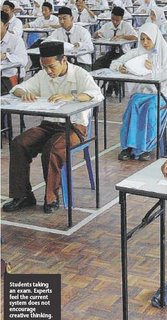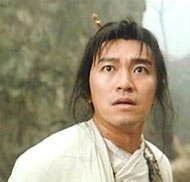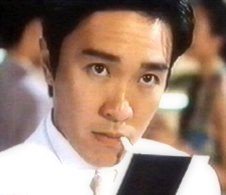What's the value of you A?

ARE examinations in Malaysia getting easier? Is this why more students are getting As?
Educationists hold varying views on the standard of today’s examinations but concur on one issue: Malaysia is producing rote-memorisers which could be behind the better results.
They agree that a different approach could result in more intelligent and creative students.
The New Sunday Times obtained copies of examination papers for English, History and Bahasa Melayu from 1980, 1986, 1996 and last year, and presented them to five educationists for their take on the issue of standards.
Most of the papers were from the Sijil Pelajaran Malaysia (SPM), which was introduced in 1964 but only held nationwide in 1987, and the Malaysian Certificate of Education, introduced in 1964 and taken over by the Examinations Syndicate in 1976.
Some were also shown other examination papers such as a Geography paper from 1973. After several days, they arrived at their verdicts.
And these were the words used commonly in their assessment of the current papers: Mechanical, less challenging, little creativity.
While all were reluctant to dismiss the present examination papers or A grade-achievers as being of lower standard, they said the current system did not encourage students to think out of the box. Neither did it prepare them for globalisation.
Some pointed out that questions in the papers from 1973 and 1980 had subjective questions which forced students to use their flair and rhythm for language.
It was also noted that papers in later years showed more attempts to engage students by using more cues, charts or pictures.
One thing was clear, though: None of them had anything bad to say about the Malaysian Examinations Syndicate. There was even praise for its integrity and professionalism over the years.
Educationist Prof Datuk Ibrahim Ahmad Bajunid said the problem did not lie with the examination questions set by the MES "which is one of the best and strongest institutions". It lay in the philosophy of the examinations approach which was based more on the British model.
Others said the younger generation could be pushed and challenged further by scrapping objective and quantitative questions and replacing them with more open-ended ones. This would allow them to be more creative besides using their intelligence.
Historian Prof Khoo Kay Kim, who was against the objective question approach, said even the British were concerned that the standard of tests was less rigorous compared to the past.
"There seems to a trend all over the world not to fail so many people. If you make it a point to pass as many people as possible, in the end, what kind of students are your schools producing?"
"We are not giving them the opportunity to think about the subject and ask questions. That kind of education is worthless. They come to university and they stay the same. They expect notes from the lecturer and answer exactly how the lecturer asked them to answer. What is the point of having that kind of education?"
Almost all pointed to the importance of the curriculum and the quality of teaching.
Former Education Ministry Director-General Tan Sri Murad Mohd Nor, said it was important students enjoyed lessons and were not taught merely to "pass the exams".
OUR PANEL OF FIVE EXPERTS
Educationist and historian Prof Datuk Khoo Kay Kim
There is no scope for expression today.
Khoo felt that students of the past were often asked to write answers on their own so that they could express themselves, especially in the English language.
But this was replaced by a new system where answers were given and they had to chose one out of the four or five provided.
"You merely picked what you thought was the right answer," he said, adding that this did not help students express their individualism.
In the English paper, for example, he noted that a question asked students to write a letter based on notes provided.
"It is all given and you don’t have to organise yourself. They also say that when writing the letter, you should remember to lay out the letter correctly, which means paragraphing. We were never told all these things."
Khoo rues the day in the 1980s when objective-type questions were the order of the day. He qualifies his reservations by saying that objective questions were all right in countries where English was the mother tongue. But he felt students in other countries needed to learn how to express themselves and could only do so if questions were open-ended.
Even those answering Bahasa Malaysia papers could face problems if they were merely answering questions without being forced to think.
He also cited an example of the geography paper of 1973 which asked students to write answers based on their observations.
A question in the paper read: "Study carefully the map, an extract of Kuantan, and answer the following questions: Describe the physical features of the coastline shown on the map extract."
"The answer is not given and you would have to describe it on your own. But now it is ‘pick one out of four or five’."
In such a system, he said, there was a possibility students could tick the right answer by chance.
He said the approach was very quantitative at the moment which helped the scoring of maximum marks "which is very difficult if a qualitative approach is used".
Khoo feels the Education Ministry should test students more rigorously if it wanted to produce quality students.
"Students should be able to explain what they have studied. That is a major part of the proof that he understands what he is talking about. In the history papers I saw, almost every answer is given.
"And you also actually force a student to give a prescribed answer, because one of five is definitely correct, according to your view. But in the past, a student could give an answer which was completely different. Now, there is no chance to do so.
"In Paper Two, they are being questioned on the textbook, and if you do not know the textbook, you do not know what they are talking about."
He also takes issue with the fact that students are not asked to "discuss" issues.
"If you have memorised the book, you can pass."
Khoo feels the approach towards education is very mechanical and "constricting the mind and fencing up things for students".
If given his way, he would do away with objective questions altogether with the exception of Science and Mathematics.
"Today, none of the subjects offer any avenue for creativity. That’s the sad thing."
VERDICT
The examination papers are very mechanical, forcing students to think within the box.
"I think we should give pupils the opportunity to express themselves and encourage them to ask questions."








0 Comments:
Post a Comment
<< Home